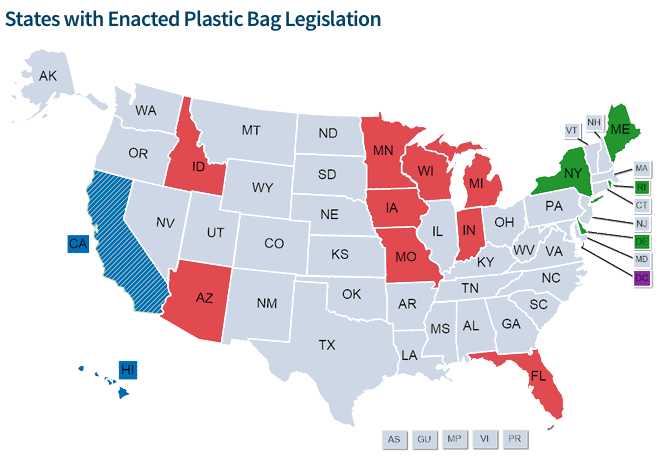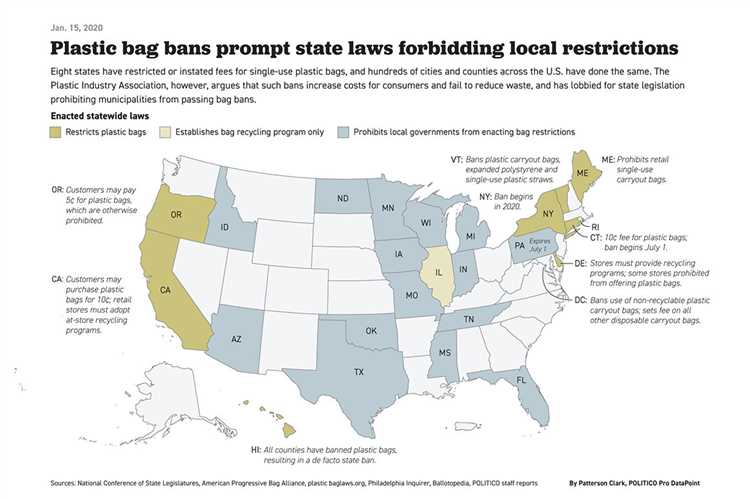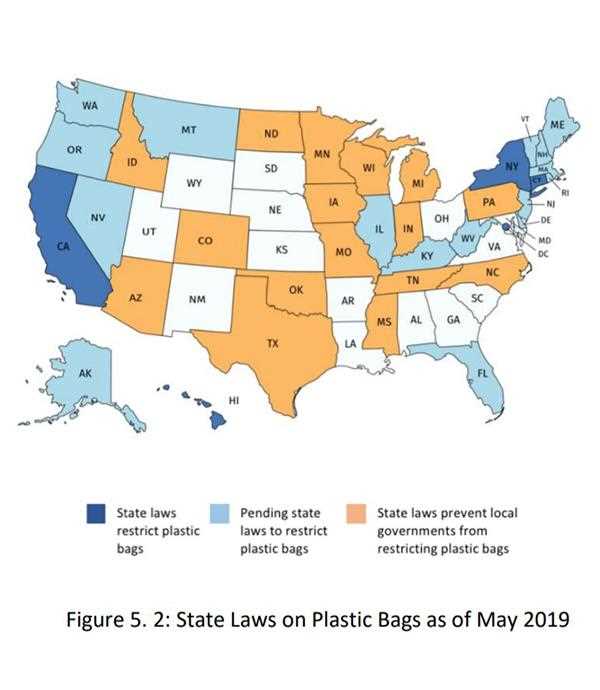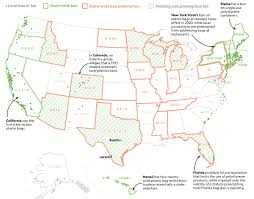
Plastic bags, once an everyday convenience for shoppers, have become a major environmental concern due to their negative impact on wildlife and their contribution to pollution. In response, a growing number of US states have taken action by implementing bans on plastic bags. These bans aim to reduce plastic waste and encourage the use of more sustainable alternatives.
One of the earliest states to pass a plastic bag ban was California, which implemented its ban in 2014. Since then, several other states have followed suit, including Hawaii, New York, and Oregon. These bans typically prohibit large retailers from distributing single-use plastic bags and instead encourage the use of reusable bags or paper bags made from recycled materials.
The rationale behind these bans is clear: plastic bags are not biodegradable and can persist in the environment for hundreds of years. They pose a threat to wildlife, particularly marine animals that can mistake them for food or become entangled in them. Additionally, plastic bags contribute to the overflowing landfills and litter our streets and waterways.
By implementing these bans, states are sending a powerful message about the importance of reducing plastic waste and protecting our environment. While there may be some initial resistance from businesses and consumers, the long-term benefits of these bans far outweigh any inconvenience. As more states join the movement, it is becoming clear that the days of plastic bags as a commonplace item may soon be a thing of the past.
- List of US states with plastic bag bans
- California
- New York
- Overview of plastic bag bans
- California’s plastic bag ban
- Hawaii’s plastic bag ban
- Implementation
- Impact
- Oregon’s plastic bag ban
- New York’s plastic bag ban
- Connecticut’s plastic bag ban
- Frequently asked questions
- Which states in the US have banned plastic bags?
- Why did these states ban plastic bags?
- Are there any exceptions to the plastic bag bans?
- How have these bans affected businesses?
- What are some alternatives to plastic bags?
- What is the purpose of banning plastic bags in the US states?
- Which US states have banned plastic bags?
List of US states with plastic bag bans
Plastic bag bans have become increasingly popular as more states recognize the negative environmental impact of single-use plastic bags. The following states have implemented bans or fees on plastic bags:
California
California was the first state to ban single-use plastic bags in 2014. The ban has been expanded over the years to include all retail stores, including grocery stores, and requires customers to bring their own reusable bags or pay a fee for paper bags.
New York

New York implemented a plastic bag ban in 2020, with fines for retailers who distribute single-use plastic bags. The ban has faced some challenges and has been temporarily suspended due to the COVID-19 pandemic, but is expected to be fully implemented in the future.
Oregon
Oregon has a statewide ban on single-use plastic bags at large retailers. The ban does not apply to smaller businesses or certain types of bags, such as those for produce or prescriptions.
Washington
Washington state has a ban on single-use plastic bags at retail establishments. The ban allows for a fee to be charged for paper bags, and certain exceptions apply, such as bags for bulk items or prescription drugs.
These are just a few examples of states that have implemented plastic bag bans. Many other states have also taken action to reduce single-use plastic bags and promote sustainable alternatives.
Overview of plastic bag bans
Plastic bag bans have become a prevalent topic of discussion and action in the United States.
With the growing concern over the environmental impact of single-use plastics, an increasing number of states have implemented bans on plastic bags in recent years. Such bans aim to reduce plastic waste, promote environmental sustainability, and encourage the use of reusable bags.
The primary goal of these bans is to curb the negative effects of plastic bag consumption, namely the pollution caused by their production, disposal, and improper recycling. Plastic bags are notorious for their durability and slow rate of decomposition, which contributes to litter and poses risks to wildlife, ecosystems, and human health.
Several states have taken the lead and passed legislation to ban or restrict the use of plastic bags. These include California, New York, Hawaii, and Oregon, among others. Local governments, including cities and counties, have also implemented their own bag bans, further contributing to the nationwide effort to reduce plastic waste.
While some critics argue that plastic bag bans may lead to increased use of alternative single-use items or inconveniences for consumers, supporters believe that the long-term benefits of reducing plastic waste outweigh these concerns. They argue that the bans encourage a shift towards more sustainable behaviors, promoting the use of reusable bags and fostering a culture of environmental responsibility.
In conclusion, plastic bag bans are increasingly gaining traction across the United States as a means to address the environmental impact of single-use plastics. These bans represent a step towards a more sustainable future, with the goal of reducing plastic waste and promoting a cleaner, healthier environment for all.
California’s plastic bag ban

California was one of the first states in the United States to implement a ban on single-use plastic bags. The ban went into effect on November 8, 2016, after a successful referendum called Proposition 67.
Under this ban, grocery stores, convenience stores, and pharmacies are prohibited from providing single-use plastic bags to customers at the checkout counter. Instead, customers are encouraged to bring their own reusable bags or purchase paper bags for a small fee.
| Key details of California’s plastic bag ban: | |
|---|---|
| Ban implementation date: | November 8, 2016 |
| Entities affected: | Grocery stores, convenience stores, pharmacies |
| Prohibits: | Providing single-use plastic bags to customers |
| Alternatives: | Reusable bags or paper bags (for a small fee) |
| Impact on the environment: | Reduces plastic pollution, promotes sustainable alternatives |
The ban has been seen as a significant step in reducing plastic pollution and promoting sustainable alternatives in California. It has contributed to a decrease in the use of single-use plastic bags, encouraging consumers to adopt more environmentally friendly habits.
Similar bans on plastic bags have since been implemented in other states across the country, inspired by California’s example. The ban serves as a reminder of the importance of reducing plastic waste and finding alternative solutions for a greener future.
Hawaii’s plastic bag ban
Hawaii is known for its pristine beaches and beautiful natural scenery. In an effort to protect and preserve the environment, Hawaii became the first state in the United States to implement a statewide ban on plastic bags. The ban was introduced in 2015 and has been successful in reducing the use of single-use plastic bags across the state.
Implementation
The plastic bag ban in Hawaii was implemented to reduce litter, protect wildlife, and promote a more sustainable way of life. It applies to all businesses, including convenience stores, grocery stores, and retail establishments. The ban prohibits the distribution and sale of non-biodegradable plastic bags that are commonly used for carrying goods.
While there is no fee or tax associated with the ban, customers are encouraged to bring their own reusable bags or purchase paper bags, which are available for a small fee. Businesses are also encouraged to offer reusable bags for sale and promote eco-friendly alternatives to plastic bags.
Impact

The ban has had a significant impact on reducing the consumption of plastic bags in Hawaii. It has helped to clean up beaches, reduce litter, and protect marine life from the harmful effects of plastic pollution. Additionally, it has encouraged a shift towards sustainable practices and raised awareness about the importance of reducing waste.
According to reports, the ban has led to a substantial decrease in the number of plastic bags used in the state. This reduction in plastic bag consumption has had a positive impact on the environment and has set an example for other states to follow.
| Year | Plastic Bag Consumption |
|---|---|
| 2015 | 600 million |
| 2016 | 400 million |
| 2017 | 200 million |
| 2018 | 100 million |
The significant decrease in plastic bag consumption demonstrates the success of Hawaii’s plastic bag ban in reducing waste and promoting a cleaner and more sustainable environment.
Oregon’s plastic bag ban
Oregon is one of the states in the United States that has implemented a ban on plastic bags. The ban came into effect on January 1, 2020.
The state has taken this environmental measure to reduce the negative impact of plastic bags on wildlife and the overall ecosystem. By prohibiting the use of plastic bags, Oregon aims to encourage residents to choose more sustainable alternatives such as reusable bags.
Under the ban, retail stores, including grocery stores, cannot provide customers with single-use plastic bags for carrying their purchases. Instead, customers are encouraged to bring their own reusable bags or purchase paper bags for a small fee.
The ban applies to almost all retail establishments, with some exceptions such as restaurants and pharmacies. However, even these exempt businesses are encouraged to reduce their use of plastic bags and explore more sustainable packaging options.
Oregon’s plastic bag ban has been well-received by environmentalists and many residents who are concerned about the growing problem of plastic pollution. It is seen as a step towards a greener and more sustainable future for the state.
By taking action to reduce plastic bag consumption, Oregon is not only protecting its wildlife and natural resources but also setting an example for other states and countries to follow. The ban is a reflection of the state’s commitment to environmental stewardship and sustainability.
New York’s plastic bag ban
New York is one of the US states that has implemented a ban on plastic bags. The ban officially went into effect on March 1, 2020. The goal of the ban is to reduce the environmental impact of plastic bags and encourage the use of reusable alternatives.
Under the ban, most retailers in New York are no longer allowed to provide single-use plastic bags to customers at checkout. This includes grocery stores, convenience stores, and other retail establishments. Instead, customers are encouraged to bring their own reusable bags or purchase paper bags or reusable bags from the store for a small fee.
The ban does not apply to certain types of bags, such as those used for prescription medication or produce, as well as bags used by restaurants for takeout orders. Additionally, certain low-income and exempt populations are not subject to the ban.
New York’s plastic bag ban has been met with mixed reactions. Supporters argue that it will help reduce litter and protect the environment, while critics argue that it places a burden on consumers and small businesses. However, many New Yorkers have embraced the ban and have already started using reusable bags to reduce their plastic waste.
Overall, the ban on plastic bags in New York is part of a larger effort to address the issue of plastic pollution. By encouraging the use of reusable bags and reducing reliance on single-use plastics, the state hopes to create a more sustainable future for its residents and the environment.
Connecticut’s plastic bag ban
Connecticut is one of the states in the United States that has implemented a ban on plastic bags. The state’s ban was enacted on August 1, 2019, with the goal of reducing plastic waste and promoting environmental sustainability.
Under the ban, retailers are prohibited from providing single-use plastic bags to customers at the point of sale. Instead, customers are encouraged to bring their reusable bags or purchase paper bags or other alternatives that are allowed under the ban.
The ban applies to all retailers, including grocery stores, convenience stores, and other businesses that sell goods. However, there are certain exceptions to the ban, including bags used for packaging bulk items such as fruits, vegetables, and meats.
In addition to the ban on plastic bags, Connecticut has also implemented a fee on paper bags. Retailers are required to charge customers a minimum fee of 10 cents for each paper bag provided, encouraging further reduction in single-use bag consumption.
The plastic bag ban in Connecticut has been well-received by environmental advocacy groups, who believe it will have a positive impact on reducing plastic pollution and protecting the state’s natural resources.
Connecticut’s plastic bag ban is part of a broader trend across the United States, with more states and cities taking action to reduce single-use plastic waste. As of now, there are 10 states in the US that have implemented a ban on plastic bags.
Frequently asked questions
Which states in the US have banned plastic bags?
Several states in the US have banned plastic bags. Some of the states that have implemented such bans include California, Hawaii, New York, and Oregon. Other states like Connecticut, Delaware, Maine, and Vermont have also adopted similar policies.
Why did these states ban plastic bags?
The states banned plastic bags primarily to reduce the environmental impact caused by their usage. Plastic bags are not biodegradable and often end up polluting water bodies and harming marine life. By implementing the bans, these states aim to encourage the use of reusable bags and promote sustainable alternatives.
Are there any exceptions to the plastic bag bans?
Yes, there are exceptions to the plastic bag bans in most states. These exceptions typically include bags used for certain products like meat, fish, and poultry, as well as bags used for medications, newspapers, and dry cleaning. Additionally, some states allow retailers to provide plastic bags for a small fee.
How have these bans affected businesses?
The bans have had varying effects on businesses. While some smaller retailers and businesses have reported increased expenses due to the need to provide alternative bags, others have embraced the bans and shifted towards using more eco-friendly packaging options. Overall, the bans have encouraged a move towards sustainable practices and raised awareness about plastic pollution.
What are some alternatives to plastic bags?
There are several alternatives to plastic bags, including paper bags, cloth bags, and reusable tote bags made from materials like cotton or canvas. Some stores also offer biodegradable or compostable bags made from materials like cornstarch or plant fibers. Many individuals have also begun using mesh bags or containers for their groceries to reduce single-use plastic waste.
What is the purpose of banning plastic bags in the US states?
The purpose of banning plastic bags in the US states is to reduce environmental pollution caused by plastic waste. Plastic bags are not biodegradable and can take hundreds of years to decompose.
Which US states have banned plastic bags?
Several US states have banned plastic bags, including California, New York, Hawaii, Vermont, and Oregon. These states have implemented the ban to encourage the use of reusable bags and reduce plastic waste.